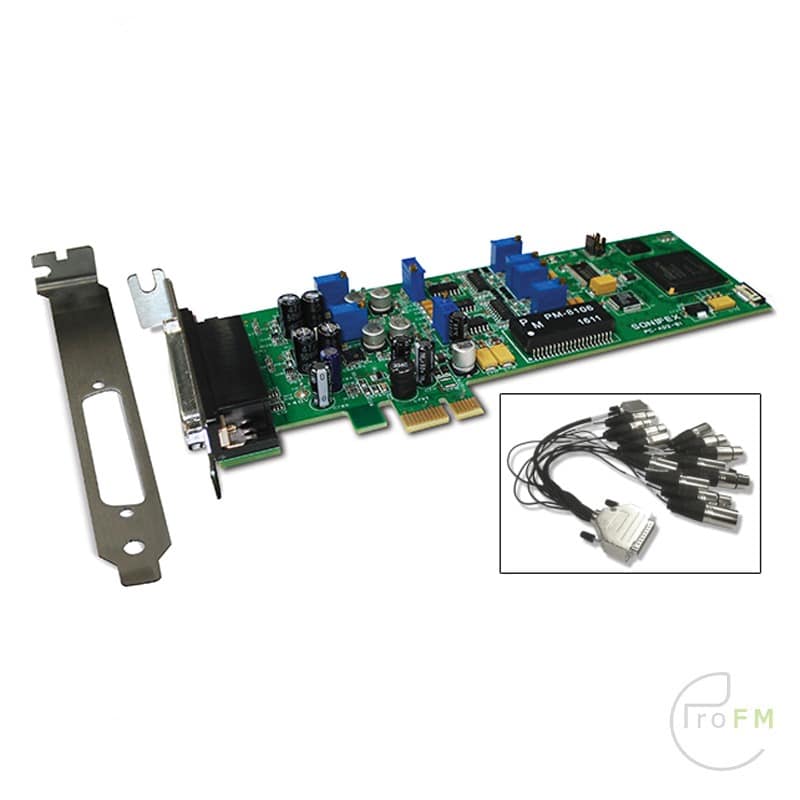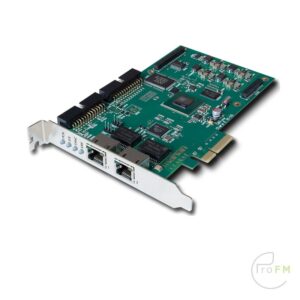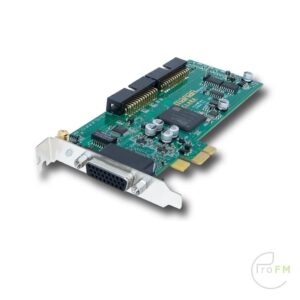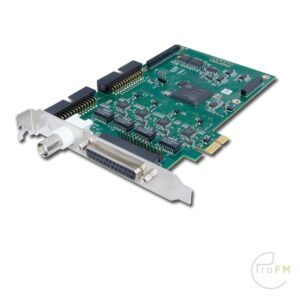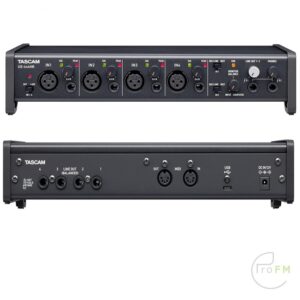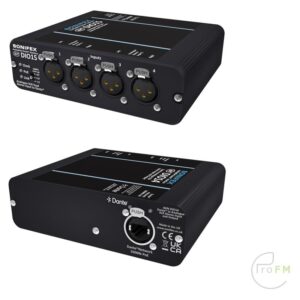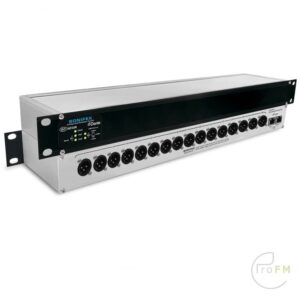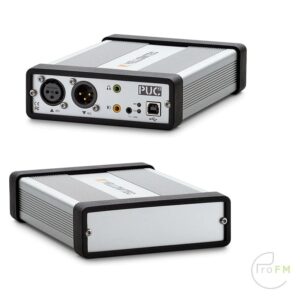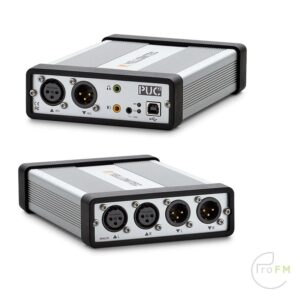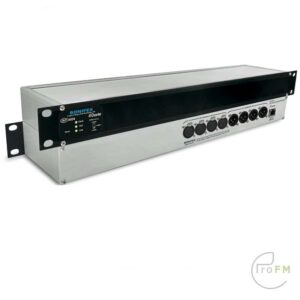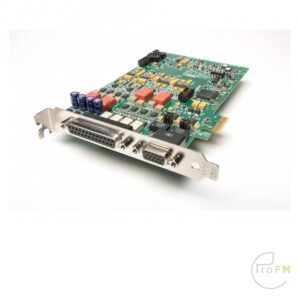Description
Sonifex PC-AD2 2 Stereo Analogue I/O & 2 Stereo AES-3 I/O PCIe Soundcard
The PC-AD2 is a dual stereo analogue input/output and dual stereo AES-3 digital input/output sound card in the PCIe half height format. One of the analogue inputs can be used as a mic input, there is a dedicated AES-11 sync input and also 2 GPIOs. It is fully compatible with the Windows™ Wave, DirectSound, DirectShow, MCI and Core Audio APIs, supporting audio up to 24 bit, 192kHz.
The PC-AD2 is a professional-quality half-height PCIe audio input-output card, offering both analogue and AES-3 stereo inputs and outputs. It is supplied with a Windows WDM driver to provide full sound card functionality on Windows 7, 8, 8.1, 10 and Windows Server 2008 R2, 2012 and 2012 R2. Many of the modern smaller PC systems only have space for half height PCIe cards – the PC-AD2 card has been designed with this in mind allowing a high channel count in a small format card.
The PC-AD2 has two stereo analogue inputs (the first of which can be used as a dual mono or stereo microphone input) and two stereo analogue outputs, two stereo AES-3 inputs and two stereo outputs, a dedicated AES-11 sync input and two general purpose (GPIO) inputs and outputs.
When acting as a microphone input, phantom power can be applied at +48V to the microphone input connection, but is removed if Line Input 1 becomes active. An audio limiter on the mic input automatically reduces the microphone gain if the recording level approaches clipping.
The peak analogue level sets the clipping threshold for the analogue inputs to one of +15, +18, +20, +22 or +24dBu. With the Windows endpoint faders set to maximum, these levels correspond to full scale on the software audio streams.
The card’s core sampling rate can be synchronised to an external source chosen from either of the AES-3 inputs, the dedicated AES-11 sync input or by using the inter-card cable (PC-AD2SY) for synchronising to another PC-AD2.
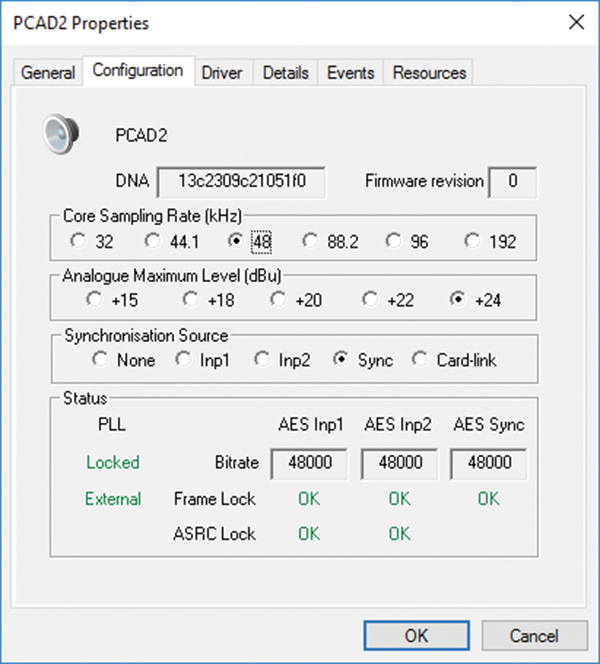
Independent asynchronous sampling rate conversion on the inputs supports rates from 32kHz to 192kHz, while the output rate can be configured as 192kHz, 96kHz, 88.2kHz, 48kHz, 44.1kHz or 32kHz, either free-running or locked to an AES11 reference on any of the digital inputs. Software sampling rate conversion is automatically inserted by Windows when the application rate does not match the hardware rate, ensuring that files of any sample rate can be played and recorded. Extended software bit depths of 32 and 24 bits are supported as well as 16 and 8 bits for playback and recording. For each AES-3 input, the received sampling rate, frame lock and sampling rate converter status is shown.
The playback and recording topology is virtualised because Windows treats each input source as its own ‘endpoint’. Endpoints are the physical audio sources and destinations, such as microphones, speakers and line connectors. Each of the PC-AD2 card’s physical line inputs is represented by an endpoint device, and as the hardware has separate A/D converters or AES-3 receivers for each one, they can be used simultaneously. A Microphone endpoint is also created which is shared with analogue Line Input 1 endpoint. The Windows mixer API is virtualised for each application, providing just a mute and volume control for each endpoint and affecting only the audio going to and from that application.
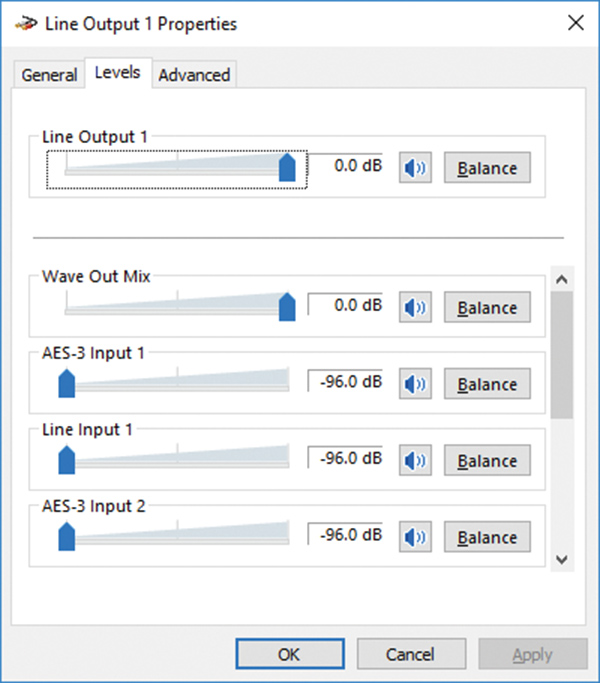
The PC-AD2 Line Output 1 Properties Page
The PC-AD2 has two optically-isolated general purpose inputs and outputs which are accessed through a programming API supplied with the driver package. A demo program is included with the driver package to illustrate the operation of the GPIO API and to quickly test the GPIO functionality.
All the standard Windows audio APIs are available including the Core Audio API, Wave, DirectSound, DirectShow, MCI and MIDI playback, as are a variety of audio compression modes via the Windows Audio Compression Manager or other software compression systems.
Multiple cards may be installed in a single PC.
A 44-pin high-density D-type connector to XLRs & 9 pin D-type breakout lead is offered as an option, the PC-AD2BC.
Features
- 2 independent transformer-coupled AES-3 inputs and outputs.
- 2 independent high level balanced stereo inputs and outputs.
- One of the stereo line inputs can act as a dual mono or stereo mic input with +48V phantom power and limiter.
- 1 AES-11 synchronisation input.
- 2 opto isolated GPIOs.
- 24-bit audio resolution.
- Sampling rates up to 192kHz.
- Asynchronous sampling rate converters on each input.
- Card synchronisation to any input, AES-11 input or other PC-AD2 card.
- 32 and 64 bit drivers for Windows7/8/10, Windows Server 2008/R2, 2012/R2.
- WDM-compliant supporting Wave, DirectSound, DirectShow and Core Audio APIs.
- Simultaneous record/play per channel.
| Technical Specification For PC-AD2 | |
| Operating Systems Supported | |
| Platform: | Windows 7, 8, 8.1 and 10 (32-bit and 64-bit versions Server 2008 R2, 2012 and 2012 R2, Windows Server 2019 |
| PCIe Specification | |
| Card Interface: | Single lane PCIe 1.1 |
| Audio Specification | |
| Analogue Sampling Rate: | 32kHz, 44.1kHz, 48kHz, 88.2kHz, 96kHz or 192kHz |
| Analogue Resolution: | 24 bits |
| Dynamic Range: | >100dB typical (unweighted) |
| Analogue THD+N: | < 0.0015% (-96dB) |
| Analogue Input Interface: | 2 x stereo balanced analogue line (1 can be switched to dual mono or stereo microphone) |
| Analogue Input Impedance: | 20kΩ (balanced line), 2.5kΩ (microphone) |
| Analogue Output Impedance: | 120Ω (balanced) |
| Analogue Maximum Signal: | +15dBu, +18dBu, +20dBu, +22dBu, +24 dBu (software settable) |
| Microphone Sensitivity: | -58dBu to +2dBu for full scale input |
| Microphone E.I.N.: | -119dBu (unweighted) (Sample rate 48kHz, max gain, 200Ω source) |
| Microphone CMRR: | 77dB @ 1kHz, 77dB @ 10kHz |
| Microphone Phantom Power: | +48V (software enabled) |
| Frequency Response: | Input – 1Hz to 88kHz Output – 1Hz to 88kHz (192kHz hardware sampling rate) |
| Digital Audio Interface: | 2 x AES-3 (formerly known as AES/EBU) inputs/outputs |
| Digital Input Impedance: | 110Ω transformer coupled |
| Synchronisation Input: | 1 x AES-11 input synchronisation: |
| Output Sampling Rates: | 32kHz, 44.1kHz, 48kHz, 88.2kHz, 96kHz and 192kHz |
| Input Sampling Rates: | 32kHz to 192kHz |
| Software Sampling Rates: | Any rate from 10Hz to 384kHz |
| Software Resolution: | 32, 24, 16 or 8 bits |
| GPIO Inputs: | Optically isolated, 2.5 to 50V on (2.5 to 50mA). |
| GPIO Outputs: | Optically isolated, 5mA max on, 80V max off. |
| Connector: | 44-pin high-density D-type female |
| Equipment Type | |
| PC-AD2 | 2 Stereo analogue I/O & 2 stereo AES-3 I/O PCIe half height sound card |
| Physical Specification | |
| Dimensions (Raw): | 18cm (L) x 7.0cm (H) x 2cm (D) 7.1” (L) x 2.8” (H) x 0.8” (D) |
| Dimensions (Boxed): | 27cm (L) x 22.5cm (H) x 6cm (D) 10.6” (L) x 8.9” (H) x 2.4” (D) |
| Weight: | Nett: 0.10kg Gross: 0.20kg Nett: 0.2lbs Gross: 0.4lbs |
| Accessories | |
| PC-AD2BC | PC-AD2 full XLR & 9 pin D-type breakout cable |
| PC-AD2SY | Cable to sync 2 x PC-AD2 cards |
- Description
-
Sonifex PC-AD2 2 Stereo Analogue I/O & 2 Stereo AES-3 I/O PCIe Soundcard
The PC-AD2 is a dual stereo analogue input/output and dual stereo AES-3 digital input/output sound card in the PCIe half height format. One of the analogue inputs can be used as a mic input, there is a dedicated AES-11 sync input and also 2 GPIOs. It is fully compatible with the Windows™ Wave, DirectSound, DirectShow, MCI and Core Audio APIs, supporting audio up to 24 bit, 192kHz.
The PC-AD2 is a professional-quality half-height PCIe audio input-output card, offering both analogue and AES-3 stereo inputs and outputs. It is supplied with a Windows WDM driver to provide full sound card functionality on Windows 7, 8, 8.1, 10 and Windows Server 2008 R2, 2012 and 2012 R2. Many of the modern smaller PC systems only have space for half height PCIe cards – the PC-AD2 card has been designed with this in mind allowing a high channel count in a small format card.
The PC-AD2 has two stereo analogue inputs (the first of which can be used as a dual mono or stereo microphone input) and two stereo analogue outputs, two stereo AES-3 inputs and two stereo outputs, a dedicated AES-11 sync input and two general purpose (GPIO) inputs and outputs.
When acting as a microphone input, phantom power can be applied at +48V to the microphone input connection, but is removed if Line Input 1 becomes active. An audio limiter on the mic input automatically reduces the microphone gain if the recording level approaches clipping.
The peak analogue level sets the clipping threshold for the analogue inputs to one of +15, +18, +20, +22 or +24dBu. With the Windows endpoint faders set to maximum, these levels correspond to full scale on the software audio streams.
The card’s core sampling rate can be synchronised to an external source chosen from either of the AES-3 inputs, the dedicated AES-11 sync input or by using the inter-card cable (PC-AD2SY) for synchronising to another PC-AD2.

Independent asynchronous sampling rate conversion on the inputs supports rates from 32kHz to 192kHz, while the output rate can be configured as 192kHz, 96kHz, 88.2kHz, 48kHz, 44.1kHz or 32kHz, either free-running or locked to an AES11 reference on any of the digital inputs. Software sampling rate conversion is automatically inserted by Windows when the application rate does not match the hardware rate, ensuring that files of any sample rate can be played and recorded. Extended software bit depths of 32 and 24 bits are supported as well as 16 and 8 bits for playback and recording. For each AES-3 input, the received sampling rate, frame lock and sampling rate converter status is shown.
The playback and recording topology is virtualised because Windows treats each input source as its own ‘endpoint’. Endpoints are the physical audio sources and destinations, such as microphones, speakers and line connectors. Each of the PC-AD2 card’s physical line inputs is represented by an endpoint device, and as the hardware has separate A/D converters or AES-3 receivers for each one, they can be used simultaneously. A Microphone endpoint is also created which is shared with analogue Line Input 1 endpoint. The Windows mixer API is virtualised for each application, providing just a mute and volume control for each endpoint and affecting only the audio going to and from that application.

The PC-AD2 Line Output 1 Properties Page
The PC-AD2 has two optically-isolated general purpose inputs and outputs which are accessed through a programming API supplied with the driver package. A demo program is included with the driver package to illustrate the operation of the GPIO API and to quickly test the GPIO functionality.
All the standard Windows audio APIs are available including the Core Audio API, Wave, DirectSound, DirectShow, MCI and MIDI playback, as are a variety of audio compression modes via the Windows Audio Compression Manager or other software compression systems.
Multiple cards may be installed in a single PC.
A 44-pin high-density D-type connector to XLRs & 9 pin D-type breakout lead is offered as an option, the PC-AD2BC.
Features
- 2 independent transformer-coupled AES-3 inputs and outputs.
- 2 independent high level balanced stereo inputs and outputs.
- One of the stereo line inputs can act as a dual mono or stereo mic input with +48V phantom power and limiter.
- 1 AES-11 synchronisation input.
- 2 opto isolated GPIOs.
- 24-bit audio resolution.
- Sampling rates up to 192kHz.
- Asynchronous sampling rate converters on each input.
- Card synchronisation to any input, AES-11 input or other PC-AD2 card.
- 32 and 64 bit drivers for Windows7/8/10, Windows Server 2008/R2, 2012/R2.
- WDM-compliant supporting Wave, DirectSound, DirectShow and Core Audio APIs.
- Simultaneous record/play per channel.
- Specifications
-
Technical Specification For PC-AD2 Operating Systems Supported Platform: Windows 7, 8, 8.1 and 10 (32-bit and 64-bit versions Server 2008 R2, 2012 and 2012 R2, Windows Server 2019 PCIe Specification Card Interface: Single lane PCIe 1.1 Audio Specification Analogue Sampling Rate: 32kHz, 44.1kHz, 48kHz, 88.2kHz, 96kHz or 192kHz Analogue Resolution: 24 bits Dynamic Range: >100dB typical (unweighted) Analogue THD+N: < 0.0015% (-96dB) Analogue Input Interface: 2 x stereo balanced analogue line (1 can be switched to dual mono or stereo microphone) Analogue Input Impedance: 20kΩ (balanced line), 2.5kΩ (microphone) Analogue Output Impedance: 120Ω (balanced) Analogue Maximum Signal: +15dBu, +18dBu, +20dBu, +22dBu, +24 dBu (software settable) Microphone Sensitivity: -58dBu to +2dBu for full scale input Microphone E.I.N.: -119dBu (unweighted) (Sample rate 48kHz, max gain, 200Ω source) Microphone CMRR: 77dB @ 1kHz, 77dB @ 10kHz Microphone Phantom Power: +48V (software enabled) Frequency Response: Input – 1Hz to 88kHz
Output – 1Hz to 88kHz
(192kHz hardware sampling rate)Digital Audio Interface: 2 x AES-3 (formerly known as AES/EBU) inputs/outputs Digital Input Impedance: 110Ω transformer coupled Synchronisation Input: 1 x AES-11 input synchronisation: Output Sampling Rates: 32kHz, 44.1kHz, 48kHz, 88.2kHz, 96kHz and 192kHz Input Sampling Rates: 32kHz to 192kHz Software Sampling Rates: Any rate from 10Hz to 384kHz Software Resolution: 32, 24, 16 or 8 bits GPIO Inputs: Optically isolated, 2.5 to 50V on (2.5 to 50mA). GPIO Outputs: Optically isolated, 5mA max on, 80V max off. Connector: 44-pin high-density D-type female Equipment Type PC-AD2 2 Stereo analogue I/O & 2 stereo AES-3 I/O PCIe half height sound card Physical Specification Dimensions (Raw): 18cm (L) x 7.0cm (H) x 2cm (D)
7.1” (L) x 2.8” (H) x 0.8” (D)Dimensions (Boxed): 27cm (L) x 22.5cm (H) x 6cm (D)
10.6” (L) x 8.9” (H) x 2.4” (D)Weight: Nett: 0.10kg Gross: 0.20kg
Nett: 0.2lbs Gross: 0.4lbsAccessories PC-AD2BC PC-AD2 full XLR & 9 pin D-type breakout cable PC-AD2SY Cable to sync 2 x PC-AD2 cards

